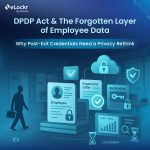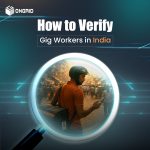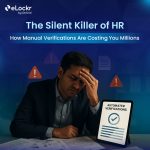Manual Verification Costs are sneakily draining HR budgets. As companies invest heavily in hiring, training, and retention, one area that remains underserved continues to create inefficiencies, delays, and regulatory risks—manual background verification.
In today’s age of the digital revolution, holding on to old verification procedures is not only a bottleneck but a million-dollar error. This article delves into the effects of manual verifications on HR activities and how platforms such as eLockr are revolutionizing the way contemporary companies verify employee documents with speed, security, and scalability.
Nearly 38% of employers report losing a candidate due to a poor background-check experience—and among them, 21% attribute it to the process taking too long.
Also read : The Role of Verifiable Credentials in Building a Remote Workforce
The Hidden Drain: What Are Manual Verifications?
Manual verifications are the old-fashioned, time-consuming methods HR teams employ to verify candidate credentials like:
- Employment history
- Educational qualifications
- Identity documents
- Reference checks
These steps typically involve phone calls, email follow-ups, document scanning, physical visits, and multiple rounds of coordination—all prone to human error, delays, and data discrepancies.
The Real Cost of Manual Verification
These processes commonly consist of phone calls, email reminders, document scanning, in-person visits, and repeated sets of coordination—all subject to human mistakes, delays, and data inaccuracies.
1. Delays in Onboarding = Revenue Loss
According to a CareerBuilder report, nearly 60% of employers lose candidates due to lengthy background checks.
The longer the verification process, the longer it takes to onboard a new hire. In competitive sectors like tech, BFSI, and gig-based employment, this lag results in:
- Loss of top talent to competitors
- Understaffed operations
- Delayed project rollouts
- Slower revenue realization
For high-growth companies, the delay of even one week in onboarding multiple employees could mean millions in opportunity cost annually.
2. Administrative Overheads
Manual verification is people-intensive. HR teams spend up to 30% of their bandwidth on chasing data from previous employers and universities. This means:
- Higher HR staffing costs
- Slower turnaround time
- Inability to focus on strategic functions like engagement and retention
By some estimates, the average manual employment verification can cost ₹500–₹800 per check, not including indirect costs like delays or failed verifications.
3. Error-Prone and Non-Compliant
Manual checks are highly vulnerable to:
- Falsified documents
- Reference bias
- Inconsistent formats
- GDPR or DPDP Act non-compliance
Errors or oversights in background checks can expose your company to serious legal, reputational, and financial risks.
Manual verification, when stretched across hundreds or thousands of employees annually, could result in ₹10–₹50 lakhs per year in preventable costs, depending on the size of your workforce.
The New Standard: Digital Verifications via eLockr
Come in eLockr—India’s top platform for consent-based, secure digital employment verifications. eLockr empowers employees to store and exchange verified employment records electronically, significantly reducing the cost, effort, and time required for verification.
That’s how eLockr turns the tables:
- Instant Verifications : No more legwork running after ex-employers. eLockr lets candidates exchange verified employment records in an instant—reducing verification times from days to seconds.
- Minimal HR Involvement : With plug-and-play APIs and easy-to-use dashboards, HR teams can send and monitor verifications without endless follow-ups or paperwork.
- 100% Consent-Based & Secure : Every piece of information transmitted through eLockr is employee-approved, encrypted, and completely DPDP and GDPR compliant.
- Scalable & Cost-Effective : Whether you are hiring 10 or 10,000 workers, eLockr lowers per-verification expenses by more than 70% when compared with manual checks.
Use Case: Scaling Gig or High-Churn Hiring
Companies in delivery, logistics, retail, or customer support deal with massive churn and rapid hiring cycles. For them, the cost of manual verification multiplies quickly.
With eLockr:
- Employers can complete background checks within a single day.
- Verified employment records stay permanently accessible to both the employee and future employers.
- HR teams can focus on quality hiring, not verification chaos.
More than Savings: Strategic Advantages
- Quicker Time-to-Hire : With real-time access to vetted records, recruitment cycles are condensed—enabling businesses to remain competitive in high-speed hiring cultures.
- Data Security & Audit Trails : eLockr delivers tamperproof digital records with full traceability, reducing the potential for audit fines, and providing complete regulatory preparedness.
- Improved Decision-Making : Verified, formatted data facilitates enhanced quality-of-hire insights and minimizes dependence on unverifiable resume assertions or biased references.
Future-Proof Your HR Stack
Modern HR isn’t just about hiring; it’s about hiring right and fast. As digital transformation sweeps across industries, clinging to manual verifications is like using a typewriter in the age of cloud computing.
Your verification processes should match the agility and scale of your business—and that’s where eLockr becomes essential.
Conclusion: Stop Leaking Money, Start Verifying Smart
Manual Verification Costs are more than just a small frustration—they’re a sneaky assassin of efficiency, talent acquisition, and compliance. If you want to drive HR operations more efficiently, protect company reputation, and grow without clogs, it’s time to digitize.
With eLockr, you’re not only reducing costs—you’re getting a competitive advantage in hiring wiser, faster, and safer.
FAQs
1. What is manual verification in HR, and why is it inefficient today?
Manual verification involves confirming candidate details like employment history and education through calls, emails, and document checks. It’s inefficient because it slows down hiring, increases administrative workload, and introduces risks like errors and data leaks.
2. How does manual verification impact the hiring process?
It leads to delays in onboarding, increases HR workload, and can even result in losing qualified candidates due to slow background check turnaround times.
3. How does eLockr help streamline the verification process?
eLockr enables candidates to store and share verified employment records digitally. This allows HR teams to verify credentials instantly, reducing manual effort and accelerating decision-making.
4. Is the eLockr platform secure and compliant with data protection laws?
Yes. eLockr ensures all verifications are consent-based, encrypted, and fully compliant with data protection laws such as India’s DPDP Act and the GDPR.
5. How fast is the verification process with eLockr compared to traditional methods?
Traditional verifications can take several days, while eLockr enables instant verifications—reducing onboarding timelines significantly.





Leave a Reply